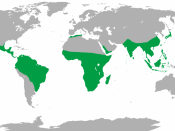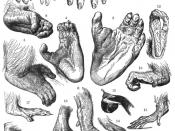Summary Paper
Machiavellian Monkeys
"The sneaky skills of our primate cousins suggest that we may owe
our great intelligence to an inherited need to deceive."
Machiavellian Monkeys, James Shreeve, Discover, June 1991.
Fraud. Deception. Infidelity. Theft. When these words are spoken, or read, the first thought is of human traits. Not once would someone think of animals as being capable of such actions, but people forget that humans are animals, and that the human animal evolved from a creature that had common ancestry with the great apes. Is it surprising then that these seemingly humanistic traits are found in primates? James Shreeve discusses the findings of hundreds of primatologists, which support the notion of Machiavellian intelligence in primates. He studied Machiavellian Intelligence in baboons, chimps, lemurs and lorises, and concluded that social primates exhibit this intelligence and those that live in small groups or in solitude do not.
First, let's examine the term Machiavellian.
The dictionary definition is: characterized by subtle or unscrupulous cunning, deception, expediency, or dishonesty. By suggesting Machiavellian intelligence, Shreeve implies that these types of behaviour are not simply conditioned responses to stimuli, but conscious thought. This might not be blatantly obvious as important to physical anthropology, but it does suggest a number of important ideas as to the development of man.
Lesser primates, such as lemurs and lorises, do not exhibit any type of deceptive traits, but when more advanced primates are examined, it can be seen that as the size of the brain increases, there are increasingly more complicated tactics used to deceive others of their own species. It is interesting to note that humans have brains roughly three times larger than would be expected, and also exhibit the most complex Machiavellian behaviours.
An important observation that Shreeve points out is that primates...


